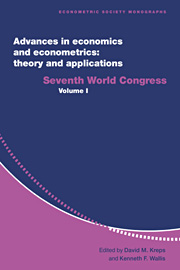Book contents
- Frontmatter
- 1 Trade and wages
- 2 Politics and trade policy
- 3 Economic analysis of political institutions: an introduction
- 4 Game-theoretic models of market structure
- 5 Rationality and knowledge in game theory
- 6 Experiments and the economics of individual decision making under risk and uncertainty
- 7 Theory and experiment in the analysis of strategic interaction
- 8 Evolutionary game theory in economics
- 9 Learning from learning in economics
- Index
3 - Economic analysis of political institutions: an introduction
Published online by Cambridge University Press: 05 January 2013
- Frontmatter
- 1 Trade and wages
- 2 Politics and trade policy
- 3 Economic analysis of political institutions: an introduction
- 4 Game-theoretic models of market structure
- 5 Rationality and knowledge in game theory
- 6 Experiments and the economics of individual decision making under risk and uncertainty
- 7 Theory and experiment in the analysis of strategic interaction
- 8 Evolutionary game theory in economics
- 9 Learning from learning in economics
- Index
Summary
The phrase “political economy” has come to mean very different things in different places. In political science departments, it generally means the study of how economic forces affect politics. As such, the phrase often has Marxist implications, because of the particular importance that Marxist theory places on economic forces for explaining political events. In economics departments, however, political economy is often taken to mean the study of political forces that affect economic activity. In classical social philosophy, the study of markets was not so separate from the study of government. The phrase “political economy” has come to mean very different things in different places. In political science departments, it generally means the study of how economic forces affect politics. As such, the phrase often has Marxist implications, because of the particular importance that Marxist theory places on economic forces for explaining political events. In economics departments, however, political economy is often taken to mean the study of political forces that affect economic activity.
In classical social philosophy, the study of markets was not so separate from the study of government. The phrase “political economy” was taken from Greek words meaning “housekeeping of city-states,” and it was applied to describe the study of how civilized societies are organized. So the classical goal of political economy was to explain the functioning of all social institutions.
The successful development of price theory forced a separation between the study of markets and the study of government. Price theory describes market competition well, but it cannot be applied to political competition. So a separation of political science from economics was necessary when price theory was the only general analytical methodology in economics. Thus economics has developed around a core analytical methodology, whereas descriptive methodologies have been more dominant in political science.
- Type
- Chapter
- Information
- Advances in Economics and Econometrics: Theory and ApplicationsSeventh World Congress, pp. 46 - 65Publisher: Cambridge University PressPrint publication year: 1997



